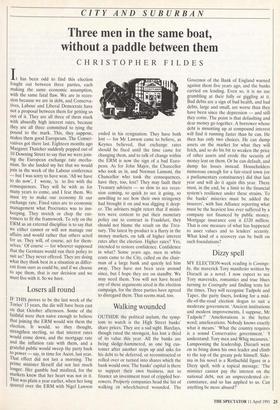Walking wounded
OUTSIDE the political asylum, the symp- tom to watch is the High Street banks' share prices. They are a sad sight. Barclays, though rated the strongest, has lost a third of its value this year. All the banks are being sledge-hammered, as one big cus- tomer after another steps up and asks for his debt to be deferred, or reconstructed or rolled over or turned into shares which the bank would own. The banks' capital is there to support their own business, not to finance an investment trust of crippled bor- rowers. Property companies head the list of walking or wheelchaired wounded. The Governor of the Bank of England warned against them five years ago, and the banks carried on lending. Even so, it is no use grumbling at their folly or giggling at it. Bad debts are a sign of bad health, and bad debts, large and small, are worse than they have been since the depression — and still they come. The point is that defaulting and dear money go together. A borrower whose debt is mounting up at compound interest will find it running faster than he can. He then has only two choices. He can dump assets on the market for what they will fetch, and so do his bit to weaken the price of other assets and erode the security of money lent on them. Or he can default, and dump his losses instead. Householders numerous enough for a fair-sized town (or a parliamentary constituency) did that last year and will do it again this year. There must, in the end, be a limit to the financial system's resilience under these strains. To the banks' miseries must be added the insurers', with Sun Alliance reporting what must be the heaviest loss ever suffered by a company not financed by public money. Mortgage insurance cost it £320 million. That is one measure of what has happened to asset values and to lenders' security. What kind of a recovery can be built on such foundations?


















































 Previous page
Previous page